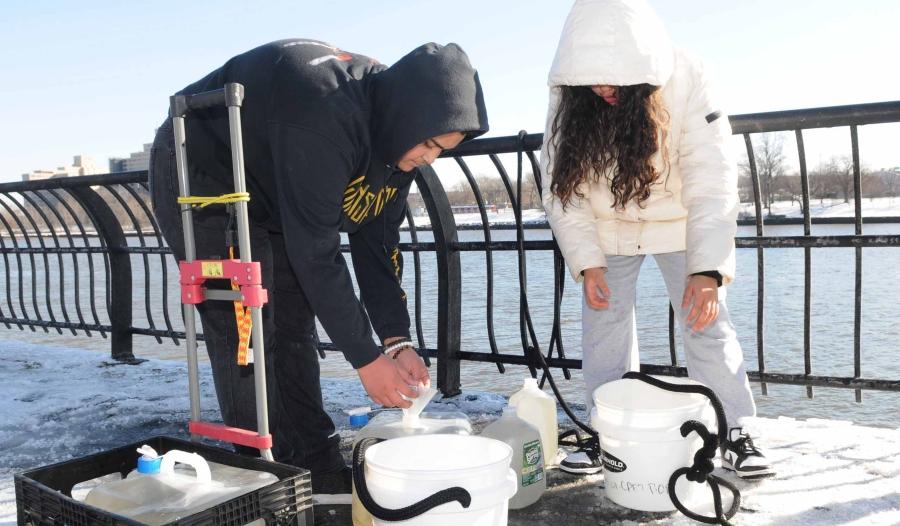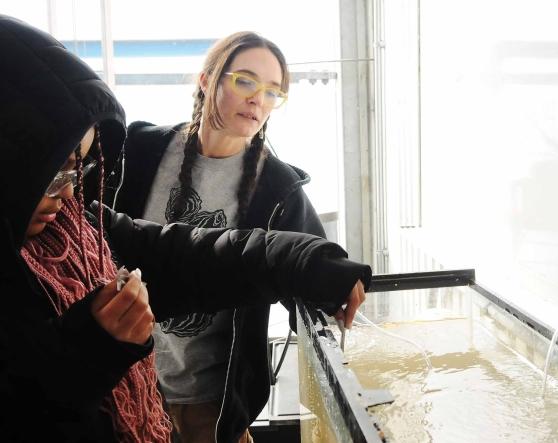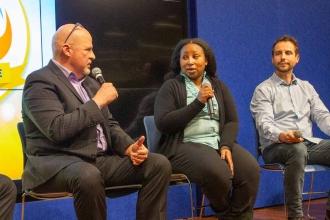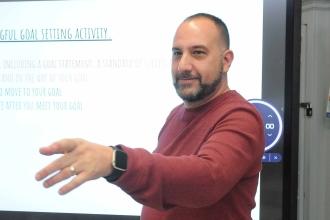Time for projects
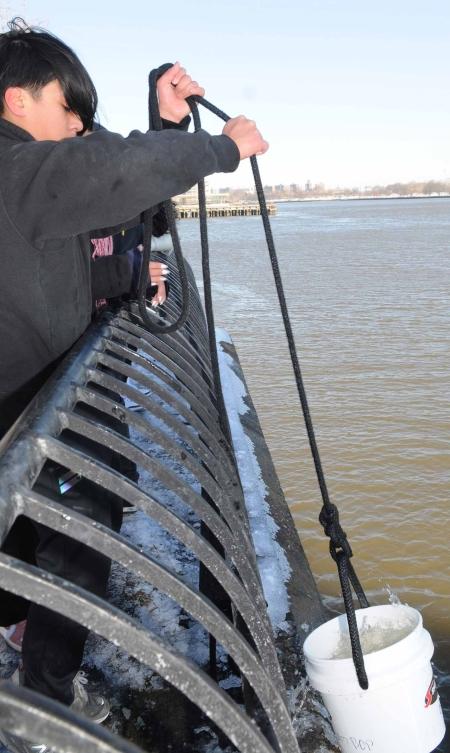
An 8th-grader hoists a bucket of water he collected from the East River.
Nine 8th-graders braved an icy walkway over the FDR Drive near their upper Manhattan school one cold January morning to collect water for their research projects on oysters, crabs and the East River ecosystem.
At the direction of social studies teacher Clarissa Lynn, they tossed plastic buckets into the nearly freezing water near East 102nd Street, heaved them up and transferred their haul into five-gallon containers that they used to fill tanks at Central Park East II school.
All students in Lynn’s 7th- and 8th-grade classes choose a “Be the Change Project” related to the United Nations’ 17 Sustainable Development Goals. They get 2.5 hours a week (half in social studies and half in science) to work on the yearlong interdisciplinary project, which includes math, science, literacy, research and data analysis. The nine 8th-graders who made the trek selected “life below water.”
Students can work for longer blocks at a time on their projects thanks to the scheduling flexibility they have as a school in the Progressive Redesign Opportunity Schools for Excellence (PROSE) program. Central Park East II, which has participated in PROSE for all 10 years of its existence, has also used the freedom that the program affords to add a new option to its teacher evaluation system, change its professional development schedule, institute restorative practices as a part of student discipline and modify parent-teacher conferences.
Nell Becker, who teaches 4th and 5th grade, said educators and administrators may have shared principles on cooperative school communities before joining PROSE, but the program has allowed authentic collaboration and distributive decision-making by giving everyone the structures, language and tools to “help us actually do it and do it right.”
Lynn, who is the school’s chapter leader, said the school has always embraced project-based learning, where students are in the driver’s seat and teachers are facilitators and coaches, but PROSE has enabled educators to deepen the focus. “By allowing children to select and have voice and have choice, you end up with students doing better work because they’re so invested in that work,” she said.
Becker said project-based work spurs students to take ownership of their learning. “They become deeply embedded in the work that they’re doing because the teacher is not telling them, ‘You have to know this.’ Their motivation is ‘I want to know this,’ ” she said.
The “Be the Change Project” is a collaboration between Lynn’s social studies class and teacher Jamie Pitger’s science class and their special education co-teachers. With four people, they can divide up to work with smaller groups of students. While Lynn is out at the East River with students, for example, other teachers support their research in the classrooms or the school’s greenhouse.
Dani, part of the group that went to the East River, said the project makes learning tactile and more meaningful. “Even though I’m frustrated that I’m freezing, I’d rather be out here than be inside just trying to memorize dates,” she said.
Teachers organize an expo each May for students to share their interdisciplinary projects. Small groups of 6th- through 8th-graders present their work to educators during roundtable discussions; 5th-graders display their projects in the library, and teachers assess them through interviews; and younger students’ projects are displayed elsewhere in the building.
PROSE enables Central Park East II to schedule a half day for children in 3-K to 5th grade on expo day. That frees up additional educators to assess older students at the expo. The event ends with a celebration, and staff members debrief for an hour afterward, part of their professional development.
All but a few of the school’s teachers opted for a modified evaluation system called Option PROSE. Throughout the school year, teachers work in small groups on a problem, question or area in which they want to improve their practice, such as early childhood phonemic awareness. These structured review committees meet at least once a month during professional development time to work on their focus areas. Activities associated with the focus are captured in a structured review that accounts for 40% of their Measures of Teacher Practice rating.
Adi Dzen, a middle school humanities teacher on the project-based assessment committee, says she has advanced her teaching practice faster because she’s learning from her colleagues in the group.
The school uses PROSE to be innovative in other areas as well. It hired a full-time restorative practices coordinator to help resolve conflicts and support students’ needs in connection with disciplinary infractions. Educators also voted to change the first parent-teacher conference of the year to a goal-setting conference.
“All of these choices that we get reflect who we are as educators and why we came into this profession, and teaching is a profession, especially in public schools, where that is not always allowed to be expressed,” said Becker. “PROSE has given us the time and space to do this work.”
'Giving control to the people doing the work'
The Progressive Redesign Opportunity Schools for Excellence (PROSE) program, which affords schools the freedom to experiment and innovate, is marking its 10th anniversary this school year. Nearly 300 teachers, chapter leaders and principals from the now 217 PROSE schools citywide gathered at union headquarters on Dec. 12 to celebrate.
‘A game-changer’
Thanks to the PROSE program, Concord HS, a transfer high school for students ages 16 to 21 on Staten Island, has been able to revamp its school hours to meet the needs of its unique student population, who have not thrived in a traditional high school. That flexible schedule means that students don’t have to choose between school and shifts at Amazon or other work.
